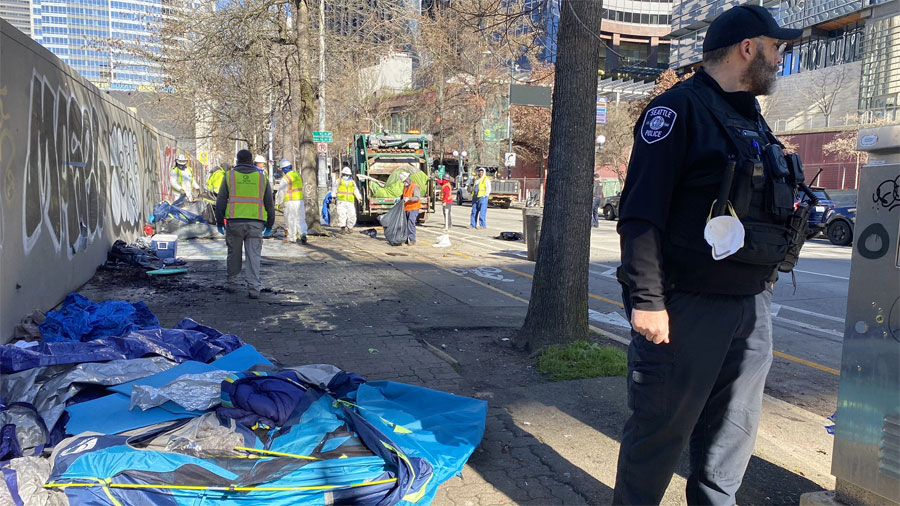‘Tough’ decisions as county authority, Seattle diverge over approach to downtown homeless camps
Mar 31, 2022, 8:53 AM | Updated: 9:06 am

The removal of a homeless camp outside Seattle City Hall. (Photo: MyNorthwest file)
(Photo: MyNorthwest file)
In February, the City of Seattle and the King County Regional Homelessness Authority (KCRHA) announced a joint initiative with a collection of local businesses to stand up a new program known as “Partnership for Zero,” created to provide end-to-end outreach to people in downtown homeless camps. Just a month later, though, there’s been a significant divide between the city and the KCRHA’s shorter term priorities as the pace of encampment clearances has accelerated.
Sweep of homeless camp outside Seattle City Hall draws criticism from activists
The City of Seattle has conducted dozens of encampment removals since the start of Mayor Bruce Harrell’s term in 2022, under the justification that tents on sidewalks should not be allowed to obstruct public rights of way. And as Harrell’s office has pointed out, there is “no requirement for offers of shelter when an encampment is creating an obstruction,” leading to many removals being conducted with little to no prior outreach. In instances where the city’s HOPE Team has been on hand to provide referrals, only half have actually led to shelter placements over the last three months, a number which is likely even higher when combined with those who opted out of sharing their data with the city.
Recent encampment removals have all also been part of a strategy that the KCRHA has voiced its explicit opposition to.
“The authority has a stance, and that stance is very straightforward — it is articulated and not moving, and that is: we don’t support displacement-based strategy, full stop,” KCRHA CEO Marc Dones said in a media roundtable on Tuesday. “It’s not data-based, and it doesn’t produce the results that folks are after.”
Despite that difference in philosophies, Dones says that discussions with Harrell’s office on moving past the city’s existing approach have yielded positive results, albeit with a more future-facing timeline.
“We are in, I would say, frankly, a good conversation right now with the mayor’s office about how to get to that place,” they described. “I’m acknowledging that we are not currently there, but I believe that we all have some of the same end states in mind as to what we’d like to see.”
“I hope that there is a path to not using displacement-based strategies countywide, [or] anywhere,” Dones added. “Because we are in a place with a robust enough peer advocate workforce, we are able to be way ahead of that.”
More work to do on shelter spaces
The issue that’s cropped up as Seattle has ramped up its encampment removals, though, is twofold — first, the city rarely has more than a small handful of available shelter spaces to offer on any given day, and second, up until recently, the spaces outreach workers have been able to offer haven’t adequately met people’s needs.
“People say no [to referrals] because things don’t make sense for them — because they’re not good,” Dones said. “What we were offering people writ large was a mat on a floor.”
“Imagine a mat on the floor was the thing that made sense,” they continued. “It’s not, but if that was a thing that made sense, we were also in most cases saying, ‘you have to be in by 7 p.m. and out by 6 a.m., there’s no place to store your things.’ That was the world, and people said, ‘that doesn’t make sense.’ It’s not supportive; there’s no way for that to become a foundation to reach any goal, housing or otherwise.”
That sentiment was echoed by REACH System Coordinator Dawn Shepard, citing her own experiences with congregate shelters.
“I can totally identify with why you don’t want to go into a congregate setting shelter, where someone’s going to be screaming in the middle of the night triggering your own PTSD, where everything that you put down and turn your back on is stolen, where you are not necessarily treated with the kindness and respect by the staff there, and that you have no place to store your belongings,” she described.
Meanwhile, efforts to expand shelter options have been slow to arrive. Seattle City Council approved funding for over 1,600 new non-congregate shelter units in 2021, but as Councilmember Andrew Lewis pointed out last year, “few of those funded shelter resources have been realized,” with efforts curtailed by a series of “bureaucratic bottlenecks” related to land use regulations, “NIMBY opposition,” and limited capacity from providers.
That’s what fueled Partnership for Zero, as part of a strategy to “push the reimagining of shelter” to offer alternative options like bridge housing, while providing a variety of other services and resources to put people on the path toward exiting homelessness.
Peer advocates
Underpinning that is a goal to ensure that even if someone turns down an offer of shelter, peer advocates — outreach workers with lived experiences of homelessness — can not only build trust and establish familiar relationships with those living in encampments, but remain in the equation down the line.
“Ideally, even if folks say no [to a shelter referral], the role of a peer advocate is to continue to stand in that space and not write people off just because they’re not accessing services and using that peer relationship,” KCRHA Peer Navigation Workforce Co-Director Joe Conniff explained. “Peer advocacy remains at the forefront of continuing to stand in that space when folks are not ready or not willing to say yes, so you can continue to work with them and find whatever stability or quality of life improvements that can continue to happen in the interim.”
And as Dones further points out, the journey of someone experiencing homelessness is rarely a linear path, making it that much more important for them to have that advocate in their orbit.
“When we talk about what resources people have access to, there’s a fixity on this idea that people move from unsheltered, to sheltered, to permanent supportive housing, and it’s three steps — that is not what the experience of homelessness is for the vast majority of people,” they explained. “What we do know is that in spaces that are enriched with longitudinal navigation, people access other systems, other resources, or community supports, and resolve homelessness through the work of that dedicated [peer] advocate — that’s what gets the job done.”
Coalition of businesses to put $10 million into Seattle homeless outreach
“And so this idea that [navigation] workers are going to have some sort of golden ticket into a shelter system or a golden ticket into permanent supportive housing, I think is a result of a fixity on an idea of what it means to exit homelessness,” Dones continued. “That does not conform or comport with the experience of the people who have experienced homelessness, or with what we see in the system data.”
That sort of approach will also take time to fully realize, leaving the KCRHA with some difficult choices to make in the meantime as the city has continued to focus its efforts on clearing obstructive encampments.
“We recognize that there are folks today who are not going to benefit from the thing that might exist in four weeks,” Dones noted. “But I think what we’re all very focused on is getting to the level of system change and broader behavior change that gets to some of the roots of these patterns, as opposed to trying to put out the fire of the moment, and that’s a tough call.”
“It doesn’t always feel great to say, ‘I need to go to work and focus on the system,’ but that is the choice that we have made.”












